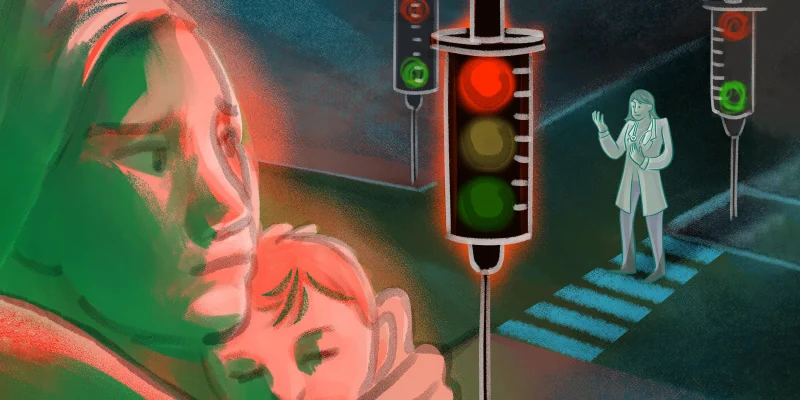Renewed awareness of the importance of colorectal cancer (CRC) screening comes urgently as deaths are projected to exceed 52,000 this year. The 2020 death of actor Chadwick Boseman drew further attention to the disease, especially in Black and younger people; and in 2021, the U.S. Preventive Services Task Force lowered the recommended age for CRC screening from 50 to 45. Doximity had the opportunity to speak with the CDC's Division of Cancer Prevention and Control on the current guidelines and what clinicians should know about the deadly cancer.
Doximity: What trends has the CDC seen in CRC screening in recent years?
CDC: Colorectal cancer is the third leading cause of cancer death for both men and women. Trends in recent years support initiation of screening earlier than age 50, and promotion of on-time screening initiation.
From 2008 to 2018, the percentage of adults aged 50-75 years receiving CRC screening based on the most recent guidelines increased from 52.1% to 65.2%. In 2018, the latest year for which incidence data are available, in the U.S., 141,074 new cases of colon and rectal cancer were reported, as well as 52,163 deaths.
From 1999 to 2019, deaths per 100,000 persons from colorectal cancer decreased among persons aged 55-64 years (from 33.5 to 24.4), persons aged 65-74 years (from 77.4 to 41.5), and persons aged 75-84 years (from 146.7 to 77.9). The death rate from colorectal cancer among persons aged 45-54 years generally increased from 1999 (11.1) to 2019 (12.0). In each year of this 20-year period, the death rate was highest among persons aged 75-84 years and lowest among persons aged 45-54 years.
Dox: What is the importance of screening patients starting now at age 45 versus previously at 50?
CDC: Age is one of the most important risk factors for CRC, with incidence rates increasing with age and more than 93% of new cases occurring in adults 45 years or older.
Incidence rates are higher in Black adults and American Indian and Alaska Native adults, persons with a family history (even in the absence of any known inherited syndrome such as Lynch syndrome or familial adenomatous polyposis), men, and persons with other risk factors (such as obesity, diabetes, long-term smoking, and alcohol use disorder). However, all adults 45 years or older should be screened, even if these risk factors are absent.
Modeling performed by the Cancer Intervention and Surveillance Modeling Network suggests that starting colorectal cancer screening at the age of 45 may moderately increase life years gained and decrease colorectal cancer cases and deaths compared with initiating screening at age 50.
Dox: Are there other associated risk factors for colorectal cancers?
CDC: CRC risk increases with age. Other risk factors include having the following: inflammatory bowel disease, a personal or family history of CRC or colorectal polyps, and genetic syndromes like familial adenomatous polyposis or hereditary non-polyposis CRC (Lynch syndrome).
Lifestyle factors that may contribute to an increased risk of colorectal cancer include a lack of regular physical activity, being overweight or obese, and alcohol and tobacco use, a diet low in fruits and vegetables, a low-fiber and high-fat diet, or a diet high in processed meats.
Dox: What are the changes to the guidelines for screening older patients?
CDC: This most current recommendation replaces the 2016 USPSTF recommendation on screening for colorectal cancer. In 2016, the USPSTF recommended screening for colorectal cancer starting at age 50 years and continuing until age 75 years. In addition, the USPSTF concluded that the decision to screen for colorectal cancer in adults aged 76 to 85 years should be an individual one, considering the patient’s overall health and prior screening history, and that screening should be discontinued after age 85 years.
In the current recommendation, while continuing to recommend colorectal cancer screening in adults aged 50 to 75 years, the USPSTF now recommends offering to screen starting at age 45 years. As it did in 2016, the USPSTF continues to conclude that screening in adults aged 76 to 85 years should be an individual decision and screening should be discontinued after age 85 years.
Dox: What are barriers to screening and how can clinicians mitigate them for patients?
CDC: Barriers to screening include lack of health insurance; lack of time for patients to get screened due to work schedules, child, and eldercare responsibilities.
Clinicians can help overcome these barriers by offering screening options and using tools such as screening reminders. Screening options include stool tests suchc as the guaiac-based fecal occult blood test (gFOBT), fecal immunochemical test (FIT), and the FIT-DNA test. Other imaging-based tests are colonoscopy, CT colonography (virtual colonoscopy), and the flexible sigmoidoscopy.
Dox: How does a patient know which screening test Is right for them?
CDC: Each test has advantages and disadvantages. Patients should talk to their doctor about the pros and cons of each test, and how often to be tested. For example, which test to use depends on your preferences, your medical condition and your personal or family history of colorectal cancer or colorectal polyps.
Dox: What are the symptoms of colorectal cancer?
CDC: Blood in the stool, stomach pain, aches, or cramps that do not go away, and unexplained weight loss. However, any of these symptoms can be caused by something other than cancer. The only way to know what is causing them is to see a clinician.
Dox: What else would you like clinicians and/or patients to know about colorectal cancers?
CDC:
- CDC encourages clinicians to access new continuing education courses that explain how to increase colorectal cancer screening and improve screening quality.
- CDC’s Colorectal Cancer Control Program helps states and tribes increase colorectal cancer screening rates. CDC’s Colorectal Cancer Control Program (CRCCP) works with clinics, hospitals, and other health care organizations to use and strengthen strategies that have been shown to increase screening (called evidence-based interventions).
- CDC’s Screen for Life: National Colorectal Cancer Action Campaign informs men and women who are 45 years old or older about the importance of getting screened for colorectal cancer regularly.
- Colorectal Cancer Screening Stories | CDC are real stories from people who have had colorectal cancer screening tests. In these stories, they describe why they did it and what the experience was like for them.
- Patients can learn about the importance of colorectal cancer screening from these CDC videos: Colorectal Cancer Resources to Share | CDC
What colorectal cancer prevention efforts are you involved in? Share in the comments below.
Interview conducted by Angelica Recierdo
Image by Denis Novikov / GettyImages







